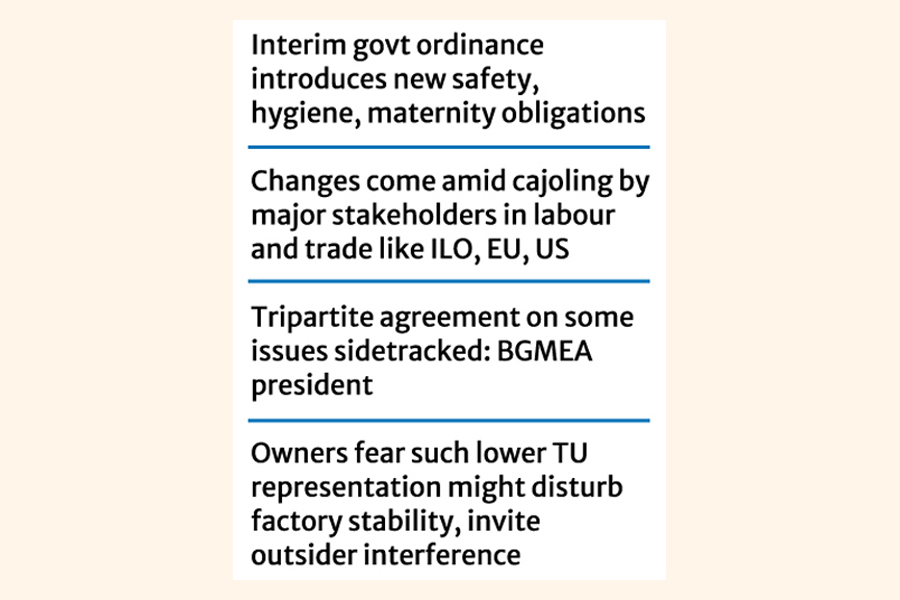
Published :
Updated :

A remade law permits minimum 20-worker trade union with redefined labour and workplace categories and employer obligations across multiple sectors in the status-upgrading Bangladesh.
The interim government amends the labour law revising several provisions, like lowering trade union-registration requirement, expanding worker and workplace definitions and categories and introducing new safety, hygiene and maternity-related obligations for employers.
According to a gazette notification, dated November 17, by the ministry of law, justice and parliamentary affairs, only 20 workers in a factory employing between 20 and 300 workers can now form a trade union.
Factory owners, however, stand opposed to the threshold provision as they feel such a lower number of workers' representation might "affect the stability of factories and allow outsider interference".
Bangladesh amends the labour law amid cajoling from global arena comprising rights bodies, investors and buyers for aligning with global standards to sustain the country's trade benefits, especially in the European Union.
The proponents of change include the International Labour Organisation (ILO), the European Union and the United States.
Under the Bangladesh Labour (Amendment) Ordinance 2025, at least 40 workers' representation would be required for factories having workers ranging from 301 to 500.
Factories having workers from 501 to 1500 and 1501 to 3000 would require 100 and 300 workers' consent respectively to form a trade union.
Some 400-worker representation is a prerequisite to form a trade union in factories with more than 3,000 workers.
Asked about the sweeping changes on the industrial front, Bangladesh Garment Manufacturers and Exporters Association (BGMEA) president Mahmud Hasan Khan says they have objections regarding trade-union- registration requirement, definition of worker and provident fund.
"The tripartite agreements regarding the issues were not followed," he alleges.
The law has broadened the labour definition by incorporating domestic, horticulture, aquaculture, and livestock workers.
Significant changes also apply to maternity protection, workplace health, hygiene and occupational safety.
Though core entitlements such as 16 weeks of maternity leave remain unchanged, the ordinance prohibits assigning pregnant or lactating workers to hazardous tasks involving toxic chemicals, radiation, extreme heat, whole-body vibration, heavy manual work and certain infectious risks.
Employers must now reassign such workers to safer duties without loss of pay, conduct medical assessments where necessary, and maintain proper records.
The upgraded law also prohibits the blacklisting of workers by any factory or establishment, meaning an employer can't prepare a list or database of workers ineligible for e-employment after termination of employment due to retrenchment, discharge, dismissal, removal, retirement or any other reason.
Munni_fe@yahoo.com


 For all latest news, follow The Financial Express Google News channel.
For all latest news, follow The Financial Express Google News channel.